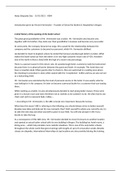1
Notes Etiquette Day – 11/01/2021 – RDM
Introduction given by Vincent Vermeulen – Founder of School for Butlers & Hospitality in Bruges
A brief history of the opening of the butler school
The great great grandfather of Mr. Vermeulen was a butler. Mr. Vermeulen also became one,
together with his brother, they took over their grandfather’s business and became very successful.
At some point, the company became too large, this caused for the relationships between the
company and the customers to become less personal, which Mr. Vermeulen disliked.
He decided to travel to England, where he visited the famous Lanesborough Hotel in London. What
makes this hotel stand out from the others is its very high customer return rate of 93%. Nowhere
else in the world is there a hotel with this high of a return rate percentage.
There is a special reason for this return rate. At Lanesborough hotel, customers really feel welcomed
because there is no physical barrier between the guest and hotel. An example: This hotel does not
have a reception desk. When guests enter to check-in, they are welcomed in a seating area where
the checking-in procedure is done while seated with the ‘receptionist’. Coffee and tea are also served
as a welcoming drink.
Mr. Vermeulen was astonished by the level of personal service in the hotel. It was exactly what he
was looking for in his company. He later on became a personal butler for a customer that was staying
there.
While working as a butler, he also simultaneously decided to start giving butler classes. These were
given in a lecture room and were therefore not as realistic as he wanted it to be. He often had to use
chairs and such to represent beds, tables,…
-> According to Mr. Vermeulen, is the ABC concept very important: Always Be Curious.
What does this mean? ABC is referring to the following: you should always strive to better yourself,
develop new ideas and look out for new concepts. Don’t limit yourself to where you currently are, try
to take the next step and allow yourself to grow in your field. You will only prosper in life if you
decide to take the leap.
As a consequence of this ABC-view, Mr. Vermeulen decided to move his lessons to another location
and opened an actual butler school with its own building in Bruges. The building has hotel rooms, a
dining area,… which help simulate more realistic situations. This is one of the only butler schools
throughout the whole world that gives trainings with lengths of up to 8 consecutive weeks. Besides
classes on etiquette, international internships at top locations are also provided during the training.
, 2
Etiquette vs Protocol (!) Examenvraag
Etiquette is something you CHOOSE to do, you are not obligated to do it but you mainly do it out of
respect for others. Etiquettes are CUSTOMARY codes of social behavior. E.g. Holding the door for
someone. Etiquette is also flexible, they can change/develop over time due to different factors. E.g.
digital etiquette because of technology – mobile phones.
<->
Protocols are fixed rules which are always related to events or ceremonies. They are codes of
conduct and behavior. They are clearly established rules that must be followed during official
ceremonies. E.g. When giving a toast to the Queen, the person giving the toast must not speak during
the national anthem. This is a fixed rule. You are not free to choose how to behave in this situation,
you must follow the protocol.
History of Etiquette
Beginnings of the term can be traced back to the Middle Ages. During the times of Louis XIV, knights
were selected to become landlords of different regions of France. To gain more land and thus more
power, they often fought with each other. One day, the king invited them all to his palace in
Versailles. The knights brought their wives with them. The wives often visited the gardens during the
day and had disruptive behavior (walking over grass, throwing flowers into the fountains,…) The
gardeners were irritated by this behavior so they decided to put warning labels all over the garden. In
French, the word ‘label’ can be translated to ‘etiquette’.
Why is etiquette important? (!) Examenvraag
3 reasons:
- We are getting rude
We often don’t realise it, but some of the day-to-day vocabulary we use can be considered rude in a
hospitality context. Words such as ‘Yes, no, okay & no problem’ are too casual and should be avoided
in a professional conversation. Language is very important, and the first thing that is taught in the
butler school is correct use of vocabulary.
- Etiquette gives us the opportunity to stand out
The way you use your voice (tone) can change the message behind your sentence completely.
Different tones transmit different emotions. Guests can feel if your “Hello, how may I help you” is
sincere or not.
- We are getting asocial
Thanks to smartphones, people have more and more difficulty socializing. We envy having
interaction online, but when it comes to real-life, most struggle making simple conversation. Add
cultural differences to the mix, and the problem becomes even more difficult. Etiquette can help
getting over these barriers. It gives you self-confidence and comfort, knowing that you’re behaving
the right way in a situation.




